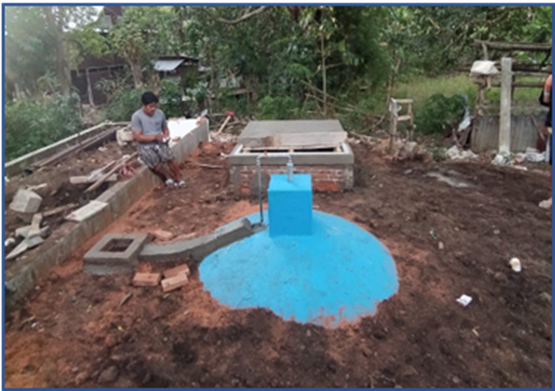Community empowerment based on utilization of livestock waste to become biogas in Bacukiki Energy Independent Village
DOI:
https://doi.org/10.22219/jcse.v5i3.28261Keywords:
Biogas, Solid Waste, Waste Gas , Watang BacukikiAbstract
Watang Bacukiki Village has a farm that produces cow manure but is not utilized. Cow manure (solid waste) eventually accumulates and creates an unpleasant odor. Based on these problems, PT Pertamina Patra Niaga Fuel Terminal Parepare carried out a CSR program by empowering the community, namely the Bacukiki Berdikari Energy Village as a form of assistance around the company's operational locations by building reactors so that cow manure does not pollute the environment and can be used as new, environmentally friendly energy, namely biogas, and compost. This program involves the community in processing cow manure. The research was carried out in collaboration with research centers, while data collection used observation, interviews, and surveys. The results of the biogas are used for household gas needs with the aim that the people in Watang Bacukiki Village can be energy independent through environmentally friendly energy that is self-produced through locally owned potential.
Downloads
References
Al Saedi, T., Rutz, D., Prassl, H., Köttner, M., Finsterwalder, T., Volk, S. & Janssen, R. Biogas Handbook; Niels Bohrs, V., Ed. (2003).University of Southern Denmark: Esbjerg, Denmark; pp. 9–10. ISBN 9788799296200
Apriantika, A. P., Anwari, R., Janah, C. N., & Syaichurrozi, I. (2022). Review: Biogas Production from Cow Dung and Its Potential in Indonesia. World Chemical Engineering Journal, 6(2), 50. https://doi.org/10.48181/wcej.v6i2.17994
Avaci AB, de Souza SNM, Werncke I, Chaves LI (2013). Financial economic scenario for the microgeneration of electric energy from swine culture-originated biogas. Renewable and Sustainable Energy Reviews 25:272-276.
B.Satata, S. y. S. S. Z. (2016). Pemanfaatan Kotoran Sapi Sebagai Sumber Biogas. Jurnal Udayana Mengabdi, 15(2), 150–158.
Darwis, R. (2015). Pengolahan Kotoran Sapi Menjadi Energi Biogas Di BBPP Batangkaluku Kabupaten Gowa. 1–81.
Eriksson, O., Bisaillon, M., Haraldsson, M. and Sundberg, J., 2016. Enhancement of biogas production from food waste and sewage sludge–environmental and economic life cycle performance. Journal of environmental management, 175, pp.33-39.
Fathurrohman, A., S, M. A. H., & Adam, M. A. (2015). Persepsi peternak sapi dalam pemanfaatan kotoran sapi menjadi bi-ogas di Desa Sekarmojo Purwosari Pasuruan. Jurnal Ilmu-Ilmu Peternakan, 25(2), 36–42. https://doi.org/10.21776/ub.jiip.2015.025.02.05
Kasinath, A., Fudala-Ksiazek, S., Szopinska, M., Bylinski, H., Artichowicz, W., Remiszewska-Skwarek, A. and Luczkiewicz, A., 2021. Biomass in biogas production: Pretreatment and codigestion. Renewable and Sustainable Energy Reviews, 150, p.111509.
Khalil M, Berawi M A, Heryanto R, Rizalie A 2019 Waste to energy technology: The potential of sustainable biogas production from animal waste in Indonesia Renewable and Sustainable Energy Reviews 105, 323–331
Korhonen, J., Honkasalo, A. and Seppälä, J.(2018). Circular economy: the concept and its limitations. Ecological economics, 143, pp.37-46.
Kucher, O., Hutsol, T., Glowacki, S., Andreitseva, I., Dibrova, A., Muzychenko, A., Szeląg-Sikora, A., Szparaga, A. and Kocira, S. (2022). Energy potential of biogas production in Ukraine. Energies, 15(5), p.1710.
Matos, C. F., Paes, J. L., Pinheiro, É. F. M., & De Campos, D. V. B. (2017). Biogas production from dairy cattle manure, under organic and conventional production systems. Engenharia Agricola, 37(6), 1081–1090. https://doi.org/10.1590/1809-4430-eng.agric.v37n6p1081-1090/2017
Ningsih, N. Z. Thamrin, Fifi Diana. 2018. Manfaat Ekonomi Energi Biogas Limbah Ternak Sapi Perah (Studi Kasus: Desa Cisondari, Kecamatan Pasir Jambu, Kabupaten Bandung). IPB
Onwuliri FC,Onyimba IA,Nwaukwu IA (2013) Generation Of Biogas From Cow Dung.J Bioremed Bioremed S18: 002. doi:10:4172/2155-6199.S18-002.
Pavičić, Josipa, Karolina Novak Mavar, Vladislav Brkić, and Katarina Simon. (2022). Biogas and Biomethane Production and Usage: Technology Development, Advantages and Challenges in Europe. Energies 15, no. 8: 2940. https://doi.org/10.3390/en15082940
Pratiwi, R. Permatasari, F. Homza, F. Teknik, and U. T. Palembang. (2019). Produksi Biogas dari Limbah Kotoran Sapi Dengan Digester Fixed Drum. Jurnal Pengabdian kepada. Masyarakat, vol. 2, no. 3, p. 10
Recebli, Z., Selimli, S., Ozkaymak, M., & Gonc, O. (2015). Biogas production from animal manure. Journal of Engineering Science and Technology, 10(6), 722–729. https://doi.org/10.1016/j.proeps.2015.08.144
Romaniuk, W., Polishchuk, V., Marczuk, A., Titova, L., Rogovskii, I. and Borek, K. (2018). Impact of sediment formed in biogas production on productivity of crops and ecologic character of production of onion for chives. Agricultural Engineering, 22(1), pp.105-125.
Sanjaya, D., & Haryanto, A. (2015). Biogas Production From a Mixture of Cow Manure With Chicken Manure. Teknik Pertanian Lampung, 4, 127–136.
Sarker, S.A., Wang, S., Adnan, K.M.M., Sattar, M.N., 2020. Economic feasibility and determinants of biogas technology adoption: evidence from Bangladesh. Renew. Sust. Energ. Rev. 123, 109766.
Soccol, C.R., Faraco, V., Karp, S., Vandenberghe, L.P., Thomaz-Soccol, V., Woiciechowski, A., Pandey, A. (2011), Lignocellulosic Bioethanol: Current Status and Future Perspectives. Europe: Elsevier.
Sorathia, H.S., Rathod, P.P., Sorathiya, A.S. (2012), Bio-gas generation and factors affecting the bio-gas generation–a review study. International Journal of Advanced Engineering Technology, 3, 72-78
Sulistiyanto, Y., Sustiyah, S. Z., & Satata, B. (2016). Pemanfaatan Kotoran Sapi Sebagai Sumber Biogas Rumah Tangga Di Kabupaten Pulang Pisau Provinsi Kalimantan Tengah. Jurnal Udayana Mengabdi, 15(2), 150-158.
Yahya, Y., Tamrin, T., & Triyono, S. (2018). Produksi biogas dari campuran kotoran ayam, kotoran sapi, dan RUMPUT gajah mini (Pennisetum Purpureum cv. Mott) dengan sistem batcH. Jurnal Teknik Pertanian Lampung (Journal of Agricultural Engineering), 6(3), 151. https://doi.org/10.23960/jtep-l.v6i3.151-160
Zhou Q, Shen F, Yuan H, Zou D, Liu Y, Zhu B, Jaffu M, Chufo A, Li X (2014). Minimizing asynchronism to improve the performances of anaerobic co-digestion of food waste and corn stover. Bioresource Technology 166:31-36. http://dx.doi.org/10.1016/j.biortech.2014.04.074

Downloads
Published
How to Cite
Issue
Section
License
Copyright (c) 2024 Makmur Ahmad Husen, F. Firman, Ulfah Sarach Sheftiana, Muhammad Iqbal Hidayatulloh, ANR Relatami, Ifhan Dwinhoven

This work is licensed under a Creative Commons Attribution-ShareAlike 4.0 International License.












